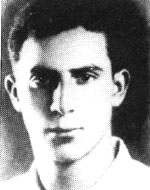Hakim, Eliyahu (“Benny”)
Son of Pauline and Shimon HaKohen. Was born on February 2, 1925 in Beirut, Lebanon, and when he was seven years old, his family immigrated to Eretz Israel and settled in Haifa, where he began to study at the “Kol Israel Haverim” elementary school. After graduating from elementary school, he continued his high school studies as a son of a well-to-do family, attracted to party life, coffee shops, movies and trips, all of which did not satisfy him. cheek. After the murder of Avraham Stern (“Yair”) Lehi commander by the British police and the temporary cessation of Lehi activity enlisted in the British army to participate in the war effort against the Germans. In the ranks of the British Army he served in the service of his organization: distributed propaganda material among the Jewish soldiers and transferred arms shipments from Egypt to the underground. With the renewal of Lehi activity in early 1944, Eliahu withdrew from the army to join the renewed campaign, and was discovered as a daring warrior and an excellent sniper, including the assassination attempt of High Commissioner Harold MacMichael, when the Lehi Center decided to assassinate Lord Moyne, The high school in Cairo was chosen to participate in the mission. He was smuggled out of the country to Cairo and began to learn the mission with his friend, Eliyahu Beit-Zuri. On November 6, 1944, the two left for the task, ambushing the Lord’s car. As the car neared the scene of the ambush, Elijah opened the back door and fired three times at Maureen. Eliahu Beit-Tzuri was forced to shoot his trio and the two began to retreat on their bikes. An Egyptian policeman who followed them shot and wounded Beit Zuri. Eliahu, when he had already avoided the chase, returned to rescue his wounded friend, but refrained from hitting the Egyptian policeman in accordance with instructions from their commanders. So they fell into the hands of their pursuers. The trial delivered deliberate political speeches against Britain and its policies in the Middle East, and these speeches made a great impression on Egypt itself and around the world and aroused great sympathy for both young people. On January 11, 1945, a sentence was issued against the two: death by hanging. “I was glad to stand this test because now, more than at any other moment in my life, I am certain of the justice of my ideas,” Eliyahu wrote to his family, “I was sent to the front and taken prisoner, and I must know not only how to fight but also how to fall. My dear parents – and I hope that today is near – when the Hebrew flag will fly over the mountains of Jerusalem and freedom will reign in all the cities of the land, and mothers and fathers will be Simcha with their children from Herut and Dror. ” On the 22nd of Nisan, 5705 (22 March 1945), Elijah was led to the condemned cell and when he put on his clothes, he said, “This is my most Yaffa suit in my life.” He asked for a sheet of paper and wrote to his parents: “My dear parents, do not grieve over me, I send a warm greeting to all the Jewish people in Eretz Yisrael and pray for the redemption of the people of Israel.” He went up to the gallows with the words “Hatikvah” and the Shema. He was buried in the Jewish cemetery in Cairo. On 22 June 1975, his bones were brought to Israel and buried at a full military ceremony on Mount Herzl in Jerusalem. The chapters of his life and heroism are commemorated in many books, among them “Ma’ase” franc; “The Book of Olei HaGardom” to me. handout; “Unknown soldiers” to me. Builder and more. In December 1982, the philatelic service of the State of Israel issued a stamp in his memory, and streets, squares and gardens are named after him in various places in Israel.
